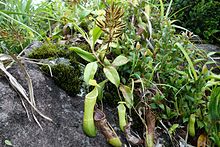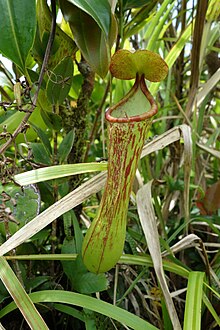Nepenthes ramos
| Nepenthes ramos | |
|---|---|
 |
|
 |
|
| Scrambling plant (top) and upper pitcher from Mount Hibok-Hibok, Camiguin | |
| Scientific classification | |
| Kingdom: | Plantae |
| (unranked): | Angiosperms |
| (unranked): | Eudicots |
| (unranked): | Core eudicots |
| Order: | Caryophyllales |
| Family: | Nepenthaceae |
| Genus: | Nepenthes |
| Species: | N. ramos |
| Binomial name | |
|
Nepenthes ramos Jebb & Cheek (2013) |
|
| Synonyms | |
Nepenthes ramos is a tropical pitcher plant native to northeastern Mindanao, the Philippines. It is known from only a handful of herbarium specimens collected in 1919 at an elevation of 670 m above sea level. It likely grows in forest on ultramafic soils.
Nepenthes ramos belongs to the informal "N. alata group", which also includes N. alata, N. ceciliae, N. copelandii, N. extincta, N. graciliflora, N. hamiguitanensis, N. kitanglad, N. kurata, N. leyte, N. mindanaoensis, N. negros, N. saranganiensis, and N. ultra. These species are united by a number of morphological characters, including winged petioles, lids with basal ridges on the lower surface (often elaborated into appendages), and upper pitchers that are usually broadest near the base.
The specific epithet ramos honours Philippine botanical collector Maximo Ramos, who collected the type material with J. Pascasio.
...
Wikipedia
